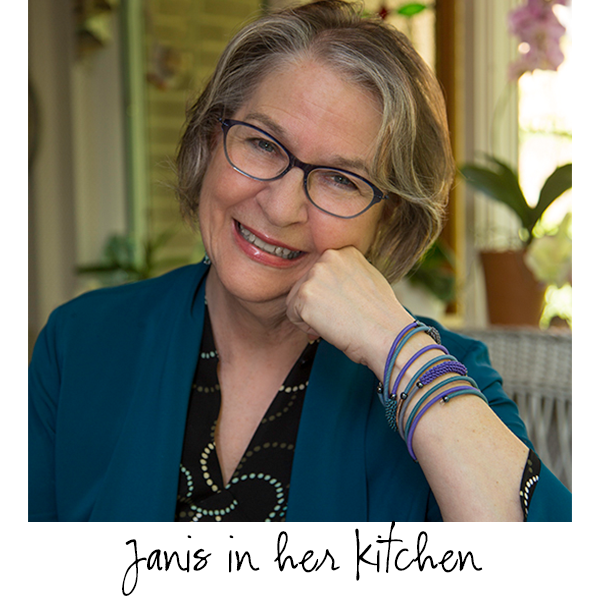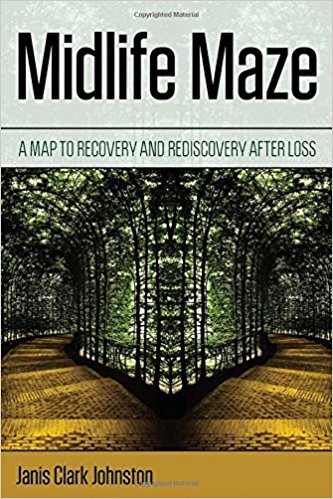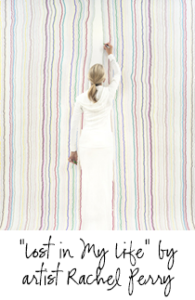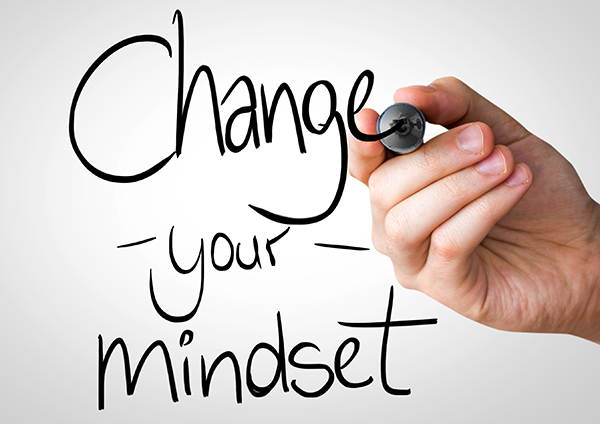When Janis Clark Johnston was 52, her husband “dropped dead of a sudden heart attack” while he was mowing their front yard. He was 54. Their son had recently graduated college and their daughter had left for her freshman year of college.
“It was shattering,” remembers Janis, now 70, who earned a doctorate in Counseling Psychology from Boston University, and has spent her entire career as a therapist for children, adolescents, and adults, in schools, mental health centers, businesses, and in her own practice. Her first book, It Takes a Child to Raise a Parent: Stories of Evolving Child and Parent Development, was published in 2013.

Janis’s new book, Midlife Maze, A Map to Recovery and Rediscovery After Loss, explores the “geography of loss in midlife, the way it can affect us, and what we can do to get back on track or redirect ourselves.”
FAB OVER FIFTY: First, please tell us how you define ‘midlife.’
JANIS: “Midlife is 35 to 64, as defined by MIDUS, a longitudinal study of midlife in the United States.”
 What motivated you to write your book?
What motivated you to write your book?
“As a family therapist, I had experienced so many people in midlife who had losses in their lives. I’m not just talking about the death of someone, although that certainly is a major loss. I’m talking about job loss, about loss of good health, your own or that of a family member. I’m talking about all kinds of loss. It’s really remarkable how much loss people experience in their lives.
“When you experience loss, you’re not very good at meeting your own basic needs. Even though I have the knowledge and the training to handle my clients when they’re experiencing loss, it was very difficult when it was my own loss. It totally changes the day-to-day way you meet your basic needs.”
How do you define our ‘basic needs’?
“I’m paraphrasing and simplifying the hierarchy of needs developed by psychologist Abraham Maslow. Everything that we need in this life comes down to how to survive, and survive well. A core self underlies all of our survival needs. But, only select individuals reach the state of self-actualization, Maslow wrote. I see this inner core of being as self territory, available to everyone.
“Five needs are easy to remember if you think of A to E, only backwards.
“E. I like to start with Energy, how you eat, sleep and exercise, but it’s just the beginning. It’s not the only thing you need to have what I’d consider a good life.
“D. To meet your energy needs, you need Discipline. You must follow a few basic rules. What do you feed yourself? How do you have the right kind of food in your refrigerator? How do you go down the grocery aisle and stay away from chips and store-bought cookies, things that have no nutritional value. How do you have the discipline to get to the gym, or get enough hours of sleep a night?
 “C. Creativity. Trying to find good ways to problem solve in this life is no easy feat, not for any of us, and it’s not easy after loss. But you’ve got to be creative This wasn’t the way I planned my life to be, but given where I am, how can I make my life count and have purpose?
“C. Creativity. Trying to find good ways to problem solve in this life is no easy feat, not for any of us, and it’s not easy after loss. But you’ve got to be creative This wasn’t the way I planned my life to be, but given where I am, how can I make my life count and have purpose?
“B. Belonging. It sure helps to have good friends and a family that you connect to. It helps to be in a community where people affirm each other. Treasure positive relationships. That’s what belonging is all about.
“A. Ability. This is the basic need of meeting your potential. Last, but certainly not least.
“I do think energy comes first, but after that there’s no set order to meet your basic needs, which you do all day long, in various ways. When you have loss, you have an even greater challenge to try and just meet your basic needs.”
When you’re so mired down in loss, (some people don’t stop feeling this way for years), you could read the book like your bible, but aren’t ‘recovery and rediscovery’ easier said than done?
“I didn’t write this book thinking it will make it easy for some people. There is no easy in life. I once worked with adolescents in our local high school, in an on-campus behavior disorder program. They didn’t do homework or go to class and they couldn’t wait to be adults. ‘If you think it’s tough to live under your parents’ roof, just you wait to discover that there’s a whole lot of responsibility ahead of you,’ I told them.” I met some of them later, as adults, and they admitted that adulthood was harder than they thought it would be.
After loss, how do you get yourself to a place where you even can meet your basic needs?
“You have to turn corners. The idea of a maze describes it. When your emotions are so intense, you just feel lost. You feel like you can’t see how to make the next decision. When you first become a widow, for example, you have to deal with reams of paperwork. It’s a lot to handle and you feel so ill equipped. You might worry that you’ll never be able to keep your house.
“The way to find your inner core of being takes creativity, but first you need to take deep breaths and be totally in the present moment. So focus on your breath. It will help you develop self-compassion, versus pitying yourself. Come up with solutions to solve problems; that makes up the creativity piece. With or without loss, we all have to prepare ourselves for the next day. Don’t spend your time worrying about the future. Think ‘what can I do today to prepare myself for the future?’”
Is there a time frame you’d recommend after which you should stop grieving and move on?
“There is no set time, and different personalities will take different amounts of time. When you lose something really big, like a person, it often brings up other loses. And our culture doesn’t handle loss very well. A woman who lost a baby late in her pregnancy, for example, may never have properly grieved the loss of the child, so it might take longer for her to get over the death of her husband.
“One woman had trouble getting over her brother dying. When he died, she started unraveling all of these other loses. She had been raped as a child and had lost a pet. When you have multiple loses, it takes grieving to another level, beyond what you think you can handle. But you have to turn corners. You simply cannot stay in the same place. Whether we have loss or not, we have to change.

“It’s really not possible to stay in one spot and think that life is going to go on the way it did yesterday or the day before. Figure out that you can’t be in a fixed mindset. You have to keep growing.”
What prevents some of us from continuing to ‘grow’?
“Carol Dweck, a psychologist at Stanford, did research to show that people in general have a fixed mindset or a growth mindset. Those with a fixed mindset think that they have a set IQ, that they’re a certain kind of a person, have a certain kind of moral character. They pretty much think that their qualities are set in plaster. They say, ‘I simply cannot live without my whatever.’
 “When you have a growth mindset, you keep growing and keep cultivating new qualities. There is more to you than you have discovered, or you rediscover aspects of your personality that you had as a kid. You have to test out your potential. What is it that you can discover or rediscover in your personality that you can bring out? That will give you purpose. In some ways your brain is working better for you after 50. Your intelligence is more crystallized. You can put your life wisdom to work for you. Pick it up and run with it. Life is precious.
“When you have a growth mindset, you keep growing and keep cultivating new qualities. There is more to you than you have discovered, or you rediscover aspects of your personality that you had as a kid. You have to test out your potential. What is it that you can discover or rediscover in your personality that you can bring out? That will give you purpose. In some ways your brain is working better for you after 50. Your intelligence is more crystallized. You can put your life wisdom to work for you. Pick it up and run with it. Life is precious.
“Think of Christopher Reeve, who experienced a catastrophic accident when he was only 42, but was able to make the most out of the situation and help others.”
What did you do when you lost your young husband?
“I put one foot in front of the next. Of course, my profession helped me enormously. When I began waking up after having dreams where I wanted to save my husband, I started writing them down. So I recommend that if you wake up after a dream where you’re connecting with a loved one who you lost, share it, write it down. Keep a pen and pad at your bedside, so you can capture the dream or parts of it. I found it to be enormously helpful to write down my dreams.
“I also kept a gratitude journal for a year after my husband died, and then after my father died at 90. I’d write down one or two things I felt grateful for, just before I went to sleep. I would take my mind to a different part of my personality. It would help me calm myself and bring me to the present moment. Journaling helped me go to sleep. Even if you have a challenging day, you need to think of something for which you feel grateful.”
Even if you’ve yet to experience loss, isn’t it a good idea to read the book to prepare you for loss?
“Even if you haven’t had a loss in your life, someone you love is probably going to die. And, as you get older, you may lose your looks or your health. But, we as women are much more than the color of our hair or the wrinkles on our faces or necks, and we must recognize that we’re giving, compassionate, smart and loving.”
“Research shows that people who make it through midlife without any loss (only 8 percent) aren’t as resilient or happy as those who have experienced some kind of loss. I want to open the conversation in this country about loss; we’re really not handling it well. There’s such an emphasis on youth in this country. We don’t appreciate elders like other countries do. All of us are important across the ages. We need to change how we look at life. Change the conversation a bit.”


One Response to “Recovering And Rediscovering After Loss”
Shalilah Russell says:
About Geri. She represents us all…